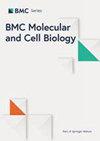High-fat diet enhances cell proliferation and compromises intestinal permeability in a translational canine intestinal organoid model
IF 2.7
3区 生物学
Q4 CELL BIOLOGY
引用次数: 0
Abstract
Emerging evidence underscores the responsiveness of the mammalian intestine to dietary cues, notably through the involvement of LGR5 + intestinal stem cells in orchestrating responses to diet-driven signals. However, the effects of high-fat diet (HFD) on these cellular dynamics and their impact on gut integrity remain insufficiently understood. Our study aims to assess the multifaceted interactions between palmitic acid (PA), cell proliferation, and the intestinal epithelial barrier using a canine colonoid model. Canine models, due to their relevance in simulating human intestinal diseases, offer a unique platform to explore the molecular mechanisms underlying HFD derived intestinal dysfunction. Canine colonoids were subjected to PA exposure, a surrogate for the effects of HFD. This intervention revealed a remarkable augmentation of cell proliferative activity. Furthermore, we observed a parallel reduction in transepithelial electrical resistance (TEER), indicating altered epithelium barrier integrity. While E-cadherin exhibited consistency, ZO-1 displayed a noteworthy reduction in fluorescence intensity within the PA-exposed group. By employing canine intestinal organoid systems, we provide compelling insights into the impact of PA on intestinal physiology. These findings underscore the importance of considering both cell proliferative activity and epithelial integrity in comprehending the repercussions of HFDs on intestinal health. Our study contributes to a deeper understanding of the consequences of HFD on intestinal homeostasis, utilizing valuable translational in vitro models derived from dogs.在犬肠道类器官转化模型中,高脂饮食可促进细胞增殖并降低肠道通透性
新出现的证据强调了哺乳动物肠道对饮食线索的反应能力,特别是通过 LGR5 + 肠道干细胞参与协调对饮食驱动信号的反应。然而,人们对高脂饮食(HFD)对这些细胞动态的影响及其对肠道完整性的影响仍然了解不足。我们的研究旨在利用犬结肠模型评估棕榈酸(PA)、细胞增殖和肠上皮屏障之间的多方面相互作用。犬类模型在模拟人类肠道疾病方面具有相关性,因此为探索 HFD 引起的肠道功能障碍的分子机制提供了一个独特的平台。犬结肠受到 PA 暴露,这是 HFD 影响的替代物。这种干预揭示了细胞增殖活性的显著增强。此外,我们还观察到横跨上皮细胞电阻(TEER)的平行降低,这表明上皮细胞屏障的完整性发生了改变。在 PA 暴露组中,E-cadherin 表现出一致性,而 ZO-1 的荧光强度则显著降低。通过采用犬肠道类器官系统,我们就 PA 对肠道生理的影响提供了令人信服的见解。这些发现强调了在理解高纤维食物对肠道健康的影响时同时考虑细胞增殖活性和上皮完整性的重要性。我们的研究利用从狗身上获得的宝贵的转化体外模型,有助于深入了解高纤维食物对肠道稳态的影响。
本文章由计算机程序翻译,如有差异,请以英文原文为准。
求助全文
约1分钟内获得全文
求助全文
来源期刊

BMC Molecular and Cell Biology
Biochemistry, Genetics and Molecular Biology-Cell Biology
CiteScore
5.50
自引率
0.00%
发文量
46
审稿时长
27 weeks
 求助内容:
求助内容: 应助结果提醒方式:
应助结果提醒方式:


